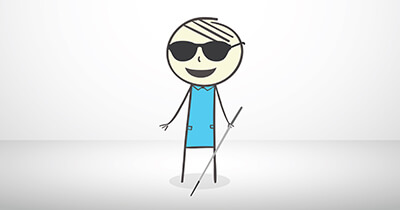Podcast Revisit: Supports for People Who Are Blind
 In recognition of Low Vision Awareness Month, we're taking a look back at one of our Ticket Talk podcasts to revisit the supports and services that may be available to you if you're blind or have low vision.
In recognition of Low Vision Awareness Month, we're taking a look back at one of our Ticket Talk podcasts to revisit the supports and services that may be available to you if you're blind or have low vision.
In this podcast, "Advice and Motivation for People with Low Vision and Blindness," we talked with Terri Uttermohlen of Social Security to discuss how Social Security's Ticket to Work program and other Work Incentives support career development for eligible people with disabilities, and specific supports and services for participants who are blind or have low vision.
What are Ticket to Work and other Work Incentives?
As Terri explains in the podcast, Social Security Work Incentives are supports that help eligible people with disabilities as they transition to financial independence through work. The Ticket program is one of more than 20 Work Incentives, and it's a free and voluntary program that helps people ages 18 through 64 who receive Social Security disability benefits (SSDI/SSI) and want to work. Eligible participants in the Ticket program work with service providers, like Employment Networks (EN) or State Vocational Rehabilitation (VR) agencies, to receive free supports and services to help them as they pursue and transition to work.
The Ticket program may be used alone or in connection with other Work Incentives, like a Plan to Achieve Self-Support or Impairment-Related Work Expenses, but Terri explains that using them together is often best.
How can Work Incentives help people who are blind or have low vision?
"Blind people [who receive Social Security disability benefits] can access any of the Social Security Work Incentives," Terri explains. "There are just a couple that are a little different."
Learn even more
Are you interested in learning more about Work Incentives and supports available for people who are blind? Check out Work Incentives for People Who Are Blind to learn about employment supports for people who are blind and receive Social Security disability benefits. The fact sheet identifies and discusses supports for people who receive SSDI or SSI.
Let's check out some of these differences:
- Once you start to work, Social Security will determine if you're engaging in Substantial Gainful Activity (SGA), or earning enough income to affect your eligibility for disability benefits. The amount of monthly earnings considered as SGA is higher if you are blind. In 2019, the SGA amount for people who are blind and receive Social Security Disability Insurance (SSDI) is $2,040. Keep in mind that the SGA amount for people who are blind does not apply to people who receive Supplemental Security Income (SSI).
- Blind Work Expenses (BWE) is a Work Incentive for people who are blind and receive SSI. BWE include any expenses that you have in connection with work. Terri explains that this could include childcare costs, transportation, lunches that you consume at work, your taxes (federal, state, local), union dues, uniforms or equipment that are required, and other items or services you need that are related to your disability.
What type of career training might a Ticket program service provider offer people with low vision or blindness?
Terri explains during the podcast that services that an EN or State VR agency provides often varies. This is because you work with the service provider to discuss your work goals, experience and needs in order to develop a plan, often called an Individual Work Plan. This plan includes an agreement about the supports and services you'll receive from your service provider. "So what kinds of services you get, everybody has to agree on them and has to decide what's going to get you to where you want to go."
She goes on, "It's really important that you don't limit yourself specifically to a disability. You say, 'Oh, I'm blind. That means I have to be a piano tuner.' There are people who are blind who are piano tuners. There are blind people who are lawyers. There are blind people that do all kinds of things. And I think it's really important that you decide first, what you want to be."
Learn more
Check out the full podcast, including the audio and transcript, to learn more about pursuing work and accommodations — including assistive technology — that may help people who are blind or have low vision succeed on the path to work.
Because Social Security's Ticket to Work program is constantly evolving and its policies change, some content presented in the podcast may not be current. For questions and updated information, please call the Ticket to Work Help Line at 1-866-968-7842 or 1-866-833-2967 (TTY) Monday through Friday, 8 a.m. to 8 p.m. ET.